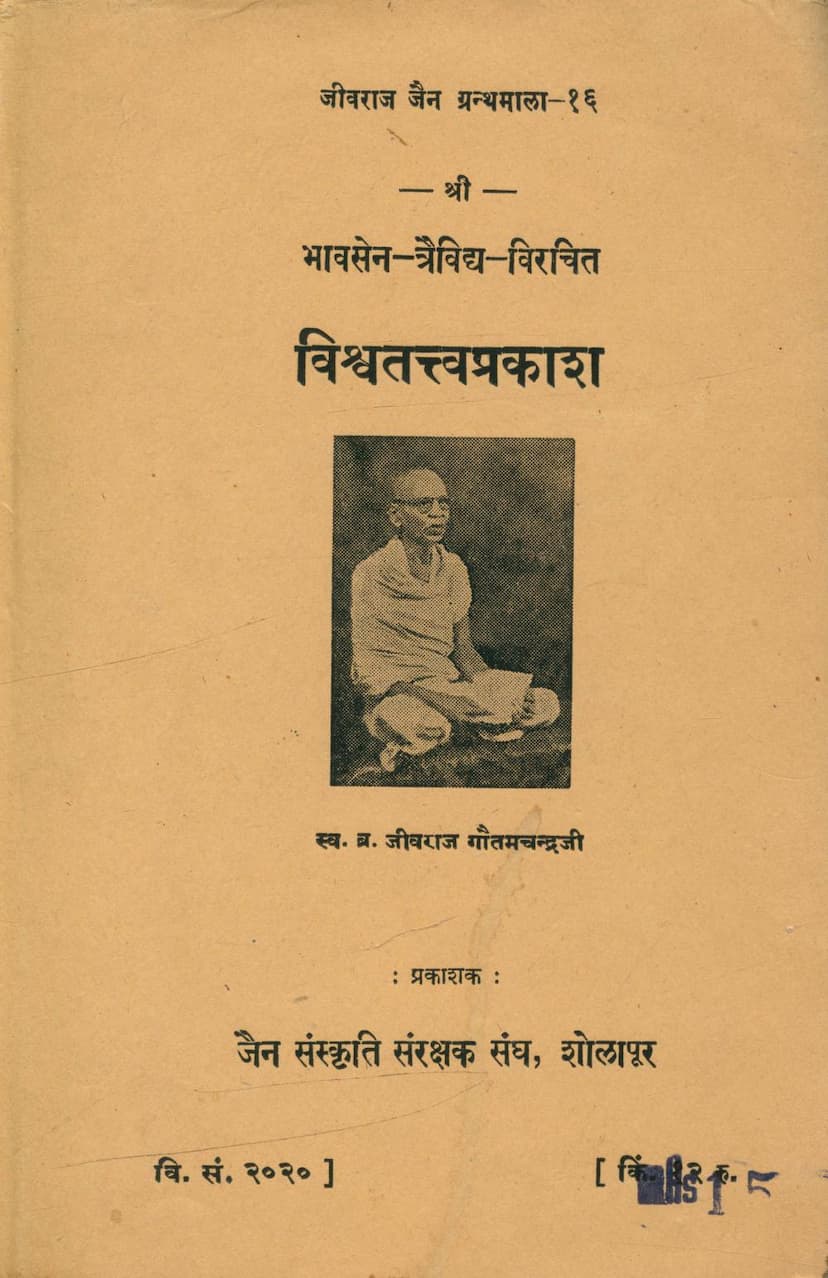Vishva Tattva Prakash
Added to library: September 2, 2025
Loading image...

Summary
The Jaina text "Viśvatattva-prakāśa" (विश्वतत्त्वप्रकाश), authored by Bhavasena Traividya, is a significant work in the field of Jaina logic and philosophy. Edited by Dr. V. P. Johrapurkar, it was published by the Jaina Sanskruti Samrakshaka Sangha, Sholapur, in 1964 as part of the Jīvarāja Jaina Granthamālā series.
Author and Context:
- Bhavasena Traividya was a prominent Jaina scholar and a triumphant disputant, likely flourishing in the latter half of the 13th century CE. His epithet "Traividya" signifies his mastery of three key branches of classical studies: Grammar, Logic (Nyāya), and Jain Canon (Siddhānta). He is also known by the title "Vādigirivajra" (thunderbolt for disputants like mountains), highlighting his prowess in philosophical debates.
- The Jīvarāja Jaina Granthamālā is a publication series dedicated to preserving, reviving, and propagating Jaina culture and literature. It was established by Brahmachari Jīvarāja Gautamchandji Doshi, who donated his entire property to the Sangha for these religious and social activities. "Viśvatattva-prakāśa" is the sixteenth volume in this series.
Content and Structure:
- "Viśvatattva-prakāśa" is presented as the first chapter (Pariccheda) of a larger work, possibly titled "Viśvatattva-prakāśa-mokṣaśāstra." This initial chapter is specifically called "Aśeṣa-paramata-tattvicāra" (अशेषपरमतत्त्वविचार), meaning "A Critical and Polemic Review of All Other Philosophical Systems."
- The work undertakes a critical and polemical review of several major Indian philosophical systems, examining their doctrines from a Jaina perspective. Bhavasena launches an attack against various schools, primarily criticizing their views and highlighting where Jainism differs.
- The systems discussed and critiqued in this first chapter include:
- Chārvāka: Critiqued on the nature of the soul (Jīva), its eternal existence, and its distinction from the body.
- Vedānta: Criticized for theories of monism, the nature of Brahman, and the concept of Māyā.
- Nyāya: Examined regarding the theory of creation and the concept of an omniscient God as the creator.
- Vaiseṣika: Discussed in relation to its enumeration of substances.
- Mīmāṁsā (Bhaṭṭa and Prabhākara schools): Debated on the doctrine of Sarvajña (omniscient being) and the authenticity of the Vedas.
- Sāṁkhya: Analyzed in the context of the nature of Puruṣa and Prakṛti, and the theory of causation (Satkāryavāda).
- Buddhism: Critiqued for doctrines like Kṣaṇikavāda (momentariness), the concept of the five Skandhas, and its path to salvation.
Methodology and Significance:
- Bhavasena's exposition is known for its logical rigor and extensive engagement with the philosophical tenets of other Indian schools. He demonstrates profound knowledge of various branches of learning and launches critiques based on Jaina principles.
- The work is valuable for students of Indian philosophy, as it clarifies the differences between Jainism and other systems on crucial doctrines.
- Bhavasena quotes extensively from both Jaina and non-Jain sources, including works like the Tattvārtha Sūtra of Umāsvāti, Āptamīmāṁsā of Samantabhadra, Sāṁkhyakārikā, Nyāya Sūtras, and various Upaniṣads, highlighting the intellectual milieu of his time.
Editing and Publication:
- The present edition is based on a paper manuscript from the Karanja Bhandara dated 1615 CE. Variant readings from another manuscript from the Humcha Bhandara (dated 1445 CE) are provided in the appendix.
- Dr. V. P. Johrapurkar's editorial work includes an introduction discussing the author and his works, a detailed Hindi summary (Sārānuvāda), and critical notes (Tippaņa). The introduction also features a comprehensive essay on the history of Jaina logical literature ("Jaina Tārkika Sāhitya").
In essence, "Viśvatattva-prakāśa" is a rigorous Jaina treatise that systematically refutes the philosophical positions of other Indian schools, primarily from a logical and epistemological standpoint, aiming to establish the validity and superiority of Jaina doctrines.